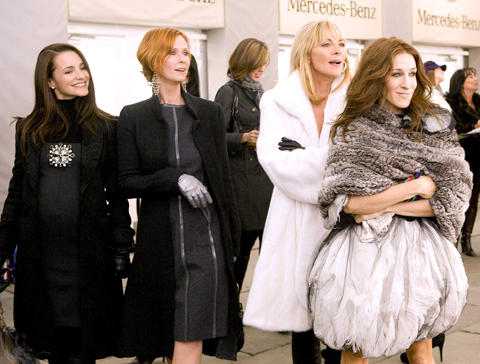A little Botox goes a long way in Sex and the City, but a little decent writing would have gone even further.
A dumpy big-screen makeover of that much-adored small-screen delight, the movie was written and directed by Michael Patrick King, one of the guiding lights and bright wits of the original series, based on Candace Bushnell’s newspaper columns and subsequent book.
Once again, Sarah Jessica Parker has stepped into the dizzyingly high heels of Carrie Bradshaw, that postmodern Lorelei Lee — a hardly working New York writer with a passion for men and Manolos — but this time she’s taken a terrible tumble.

PHOTO COURTESY OF LONG SHONG
Fans of the show were accustomed to Carrie’s falls, metaphoric and literal (as in her spectacularly horrible trip during her catwalk promenade); they were crucial to the show’s appeal, softening its hard, brittle edges. Then in her mid-30s, Carrie was one of New York’s most fearless of the zipless It Girls, able to leap tall men in a single bound without batting a single mascaraed eyelash, but as the show’s nifty opening credit sequence reminded you, episode after episode, she wasn’t above getting muck on her tutu. Her vulnerability — and that of her girlfriends — was the badly kept secret of the show, the glue holding together the froufrou, the lunches, those absolutely fabulous and ghastly clothes and all that muscly man bait.
The froufrou and the lunches are back, as are, kind of, Carrie’s three girlfriends, Miranda (Cynthia Nixon), Charlotte (Kristin Davis) and Samantha (Kim Cattrall), all tricked out with their customary accessories (men, children, handbags). Also back and in and out of Carrie’s bed is Mr Big (Chris Noth), the longtime lover and habitual heartbreaker with whom she had (hallelujah) reunited during the show’s bitter and sweet finale four years ago. Written by King, that episode opened with Carrie wandering Paris in a funk and then stumbling into bliss by literally falling to the ground with Big. At once melancholic and defiantly hopeful, it was the kind of rueful happy ending that didn’t make you choke on your own tears.
Sex and the City delivered the television goods for six seasons, no small thing in the pop culture annals. That should have been enough or at least plenty for all concerned, but Parker apparently felt compelled to go big screen, making good on a project that had started to come together in 2004, only to fall apart over money issues and Cattrall’s reluctance to climb aboard.

PHOTO COURTESY OF LONG SHONG
I wish Parker had let that bee in her bonnet go silent, because the movie that she and King have come up with is the pits, a vulgar, shrill, deeply shallow — and, at two hours and 22 turgid minutes, overlong — addendum to a show that had, over the years, evolved and expanded in surprising ways.
There are no surprises in the movie, at least not good ones. On opening, all the peas are in their designer pods, from Carrie and Big cooing in his swank New York digs to Samantha and her boy toy, Smith (Jason Lewis), sunning in a seaside Los Angeles perch. Charlotte and her husband, Harry (Evan Handler), are nesting in Manhattan; Miranda and her husband, Steve (David Eigenberg), are bunking in Brooklyn. All is right in this carefree world until Big casually asks Carrie if she would like to get married, a question that leads to the usual luncheon postmortem (oh my gawd, he proposed) and then the usual rom-com clothing montage and a staggering number of product placements. (Louis Vuitton co-stars.)
Somehow it all goes lugubriously south. Carrie is let down Big Time, and she licks her wounds down Mexico way, accompanied by her amazingly accessible gal pals. Jokes about Montezuma’s revenge ensue (really), along with hard laughter and free-flowing tears and yet more clothes (and clothing montages) and jokes and jokes, most of them flatter than Carrie’s steely six-pack.

PHOTO COURTESY OF LONG SHONG
Unlike the show, which allowed the men to emerge occasionally from the sidelines with lines of actual dialogue, the male characters in the movie stand idly by, either smiling or stripping, reduced to playing sock puppets in a Punch-free Judy and Judy (times two) show. I’m all for the female gaze, but, gee, it’s also nice to talk — and listen — to men, too.
I guess size does matter after all, if not in the way that the sex-addled Samantha might assume. On television and in tasty 30-minute bites, the show Sex and the City managed to entertain and sometimes even enthrall with self-consciously glib morality stories about love and desire in the modern world. Everything scaled nicely to television’s modest dimensions, from Parker’s Cubistic face to Patricia Field’s costumes. Kooky and at times insanely unflattering, the clothes caught your eye instantly, directing your attention to the itty-bitty figures, exactly what they were supposed to do. But those same loud outfits, mugging faces and picayune dramas just don’t translate when blown up on a movie screen, which makes all that small-screen stuff seem even punier.
There was something seductive about the bubble world that the show created back in 1998, in the fantasy that all you needed to make it through the rough patches were good friends and throwdown heels. That was a beautiful lie, as the show acknowledged in its gently melancholic return in the wake of Sept. 11. Back in Season 3 Carrie asked, “Are we getting wiser, or just older?” The ideal, of course, is to do both. There is something depressingly stunted about this movie; something desperate too. It isn’t that Carrie has grown older or overly familiar. It’s that awash in materialism and narcissism, a cloth flower pinned to her dress where cool chicks wear their Obama buttons, this It Girl has become totally Ick.

April 28 to May 4 During the Japanese colonial era, a city’s “first” high school typically served Japanese students, while Taiwanese attended the “second” high school. Only in Taichung was this reversed. That’s because when Taichung First High School opened its doors on May 1, 1915 to serve Taiwanese students who were previously barred from secondary education, it was the only high school in town. Former principal Hideo Azukisawa threatened to quit when the government in 1922 attempted to transfer the “first” designation to a new local high school for Japanese students, leading to this unusual situation. Prior to the Taichung First

When the South Vietnamese capital of Saigon fell to the North Vietnamese forces 50 years ago this week, it prompted a mass exodus of some 2 million people — hundreds of thousands fleeing perilously on small boats across open water to escape the communist regime. Many ultimately settled in Southern California’s Orange County in an area now known as “Little Saigon,” not far from Marine Corps Base Camp Pendleton, where the first refugees were airlifted upon reaching the US. The diaspora now also has significant populations in Virginia, Texas and Washington state, as well as in countries including France and Australia.

On April 17, Chinese Nationalist Party (KMT) Chairman Eric Chu (朱立倫) launched a bold campaign to revive and revitalize the KMT base by calling for an impromptu rally at the Taipei prosecutor’s offices to protest recent arrests of KMT recall campaigners over allegations of forgery and fraud involving signatures of dead voters. The protest had no time to apply for permits and was illegal, but that played into the sense of opposition grievance at alleged weaponization of the judiciary by the Democratic Progressive Party (DPP) to “annihilate” the opposition parties. Blamed for faltering recall campaigns and faced with a KMT chair

Article 2 of the Additional Articles of the Constitution of the Republic of China (中華民國憲法增修條文) stipulates that upon a vote of no confidence in the premier, the president can dissolve the legislature within 10 days. If the legislature is dissolved, a new legislative election must be held within 60 days, and the legislators’ terms will then be reckoned from that election. Two weeks ago Taipei Mayor Chiang Wan-an (蔣萬安) of the Chinese Nationalist Party (KMT) proposed that the legislature hold a vote of no confidence in the premier and dare the president to dissolve the legislature. The legislature is currently controlled